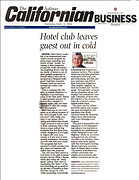Integrity
Matters
March 31, 2004
Hotel
club leaves guest out in cold

 Question: (E-104)
Question: (E-104)
Dear
Jim:
I
have been a member of an international hotel chain's awards
program for seven years, amassing over 35,000 of their
"points" for staying at their properties around
the world. Recently I was inquiring about a trip for my
family of seven to one of their premier properties in
Hawaii when I was told my account as a "frequent
hotel guest" had been canceled because I had not
used my account for a year. I feel ripped off.
Does
a company like this have an ethical obligation to highlight
to its customers some of the "fine print" before
it takes harmful actions? Or does it show integrity to
reserve rights, then use them whenever it suits the company's
accountants?
 Response:
Response:
Welcome
to your new status as an official member of the "now-you-got-it-and-
now-you-don't" club. Sadly, your story is not unique.
Hotel chains and airlines have found "legal"
avenues to ask for loyalty from customers only to find
ways to create self-serving loopholes that free them from
certain obligations. If not legally "ripped off,"
your story sounds as if you were at least morally mistreated.
Obviously, you will vote with your wallet. The programs
that were intended to build customer loyalty, when not
honored, will defeat their own purposes.
The
real issue here seems to boil down to the path business
leaders choose. What a shame when they select the "shell-game"
option. They elect to manipulate the "letter"
of the law, providing just as small of an amount of benefits
as they feel they can get by with, while presenting a
potentially misleading face of generous customer service.
They design clever and attractive promises, announced
with bold print and enthusiasm, and then protect, minimize
and defend their downside obligations. They employ "legalese"
in their documents and "doublespeak" through
their customer service programs, along with enough "use
restrictions" that only a minority of those who felt
entitled to the rewards can meet the criteria to conveniently
utilize them.
The
ploys used by airlines and hotel chains may require the
same investigation and regulation that finally occurred
when the incessant, dinner-hour telemarketing calls were
challenged and stopped.
This
lack of responsible self-regulation by the telemarketing
industry was motivation enough for the establishment of
the "National Do not Call Registry," which,
as you know, reshaped how one industry was able to do
business. Does anyone miss those nightly calls that interrupted
reading, dinner, important conversations or simply time
to relax? The answer is probably not. Airlines and hotels
that employ such practices, take notice: Customers are
fed up.